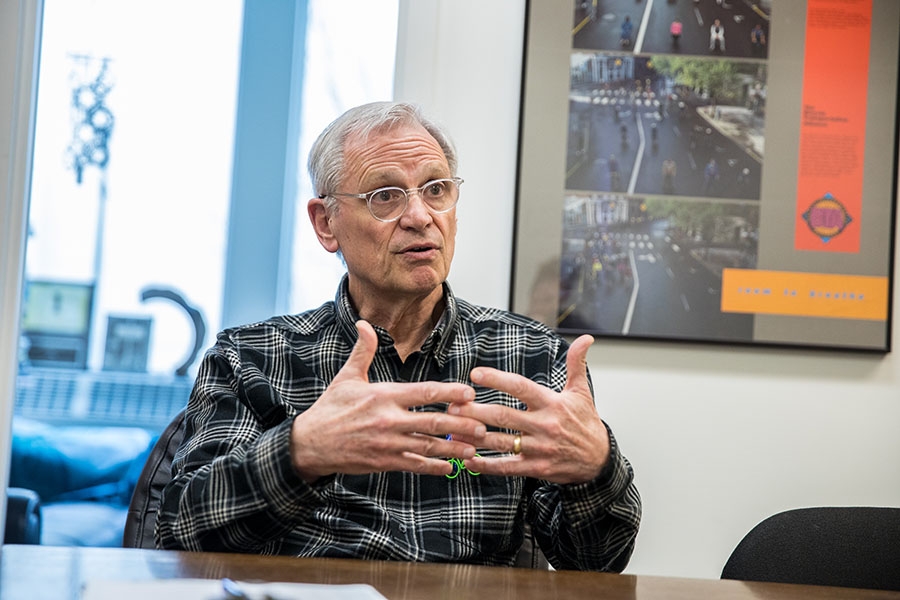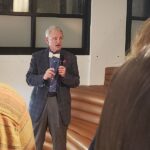‘I have a lot of things I want to work on, and I don’t think any of them are going to be advanced in a dysfunctional Congress’
After 27 years in Congress and 57 years in elected office, Rep. Earl Blumenauer announced he will not seek reelection in 2024, vacating his long-held seat in Oregon’s 3rd Congressional District. Known for his championship of progressive causes, participation in climate-related committees and caucuses, and biking around the Capitol with his trademark bike pin, Democratic colleagues are already mourning his departure.
A member of the Committee on Ways and Means and its Subcommittee on Health, Blumenauer also sits on the Congressional Progressive Caucus, the Congressional Cannabis Caucus and the Human Rights Commission. He also founded the Congressional Bike Caucus, a 107-member bipartisan caucus to promote cycling and improve biking infrastructure; last year, the Portland Bureau of Transportation opened the Blumenauer Bridge, a pedestrian and bike bridge across I-84 in Northeast Portland, in honor of his longtime transportation advocacy.
Blumenauer is also known for his work decriminalizing and de-scheduling cannabis, promoting efforts to expunge the records of people with cannabis-related criminal charges, and helping Oregonians of color obtain cannabis licenses.
Recently, Blumenauer introduced the bipartisan Import Security and Fairness Act, co-sponsored by Florida Republican Rep. Neal Dunn, Ohio Democratic Sen. Sherrod Brown, and Florida Republican Sen. Marco Rubio to address a de minimis threshold loophole allowing imports valued under $800 to come into the United States without paying duties, taxes, fees or undergoing rigorous inspection.
In an interview with Oregon Business, Blumenauer expressed his frustration with what he sees as the dysfunction of the current Republican-held House of Representatives, and its problems passing legislation.
He was also optimistic about the future of the Biden Administration’s large-scale infrastructure investments and the Inflation Reduction Act, a landmark climate, health and tax law that allocated billions of federal dollars toward renewable energy projects, as well as the future of bicyclers in Portland and across the country.
This interview has been edited for length and clarity.
What is behind your decision to retire?
Because it seemed to me that the things that I wanted to do would not be most effectively accomplished by spending two more years of my life in a dysfunctional Congress.
What about Congress makes it so dysfunctional and so difficult for you to want to continue there?
Have you been watching what’s been going on here? Republicans today pulled another bill they don’t have the votes to pass. They can’t figure out why they’re impeaching Joe Biden. They just elected as Speaker someone with virtually no major experience, who has extreme positions, and we’re heading towards another government shutdown.
The most jarring thing is they can’t agree amongst themselves. What is it they’re going to do to get out of this funding problem? We had an agreement that everybody signed onto in the spring; the President, the Senate, and 148 Republicans voted for it. They refuse to answer or to agree to follow what they negotiated in the spring. I mean, this is really embarrassing and it’s a huge problem for people in the bureaucracy.
I had dinner with a major ambassador last night and they were scratching their heads, trying to figure out what the trade policies are. It’s no way to run a government and the good news from where I sit, is that next year it’s very, very likely that Democrats will control the House.
For me, taking several months of my life to run for reelection and then spend two more years of my life in an area where it looks like Congress is increasingly incapable of being able to move stuff forward, I have a lot of things I want to work on, and I don’t think any of them are going to be advanced in a dysfunctional Congress.
But just last year President Biden and Congress passed the Inflation Reduction Act, and a bipartisan infrastructure bill before that, all with Democratic support from members of Congress like yourself.
These last two years of Congress were my most productive. What I did with the Inflation Reduction Act and the [Bipartisan Infrastructure Bill], and some of the things we’re doing in terms of trade policy, but this has been a nightmare year.
I started the year in Houston working with groups that were deeply excited about the energy provisions. We’re still working to implement them and that’s something that I plan on doing for the rest of this Congress —and helping people in the future so that the resources don’t go away and there may be ways that I can help people figure out creative ways to use them. But after 50 years in elective office, I don’t think that I need to spend 14 hours a week on airplanes to deal with an increasingly dysfunctional organization. I’d rather work with groups and organizations on things that I think are important without being bogged down with politics.
You’ve been a big leader in sponsoring legislation to support cannabis businesses. Oregon’s cannabis sector is still really struggling, and we don’t have federal legalization or banking. Why has that been so difficult?
Despite 50-year effort on my part, the government has not been able to step up and play its appropriate role, although I’m very pleased with the legislation that I have been able to support.
We passed the Safe Banking Act seven times in the House, and it now looks like we are starting to move in the Senate. I’ve been involved with every state effort, and this week we had Ohio become the 24th state to legalize and voted for it overwhelmingly, despite the efforts of the Ohio legislature to torpedo it.
I have the first legislation that modified the Controlled Substances Act dealing with research. That’s a huge area. We don’t have a test for impairment. There are thousands of people every day who fail pre-employment drug tests, and we’ve got legislation that is going to help in moving that forward. Working with the administration on two things that are important: One deals with providing pardons for a number of people for drug-related offenses, it’s not the federal government that has imprisoned the majority of them, but it’s setting the tone for what’s going to happen with the state.
We’ve also been pushing to have the reclassification of cannabis. It looks like the administration is only going to make it a Schedule III drug; that solves a major problem I’ve been working on for years. Businesses cannot deduct their business expenses, so they pay two and three times what average businesses would pay. And it looks like as a result of trying to get this rescheduled that will go away. And it basically cut their taxes in half or a third or more.
What projects are you most looking forward to outside of Congress?
What I’ve been doing this year that I’m most excited about is working with the administration and people around the country to figure out how to use the pieces I authored, which are the most extensive green energy provisions in history anywhere, not just in the United States.
It’s really exciting, finally having the resources to do what we’ve been talking about, having this gusher of federal money. What we’re doing in terms of Amtrak transit, in terms of the revitalization of 82nd Avenue, the safety provisions. Four hundred and 73 communities are going to have planning grants to deal with by Vision Zero. We have a billion dollars to implement.
In 2024 I have to wrap up this term of Congress. I’m still at Congress for 14 months. But I just returned from two days of national conference in Arizona, where we were dealing with transportation safety, light rail and bicycles. These are areas that have been extraordinarily satisfying for me. We pioneered some of this in Oregon. It’s been taking root in other parts of the country. Burning fossil fuel is not high on my priority. I’d rather people burn calories.
Will we also have work on trade, fixing the de minimis loophole that allows China to ship three million packages a day into the United States uninspected. It looks like fentanyl is increasing using this shipping.
What would be your advice to whoever ends up winning Oregon’s 3rd Congressional District in 2024?
I would look for things that bring people together, rather than divide them. Spend time and energy learning issues and the process in the house and build relationships because someday. Things will return to normal and will start legislating again, and they can start building their seniority and their knowledge of the process and not waste a lot of time going forward.
One of your biggest claims to fame is your bike riding and your ability to coax others into bike riding. How effective was your biking campaign over the course of your career in Congress?
I’ve been working on this for 40 years. We started the bike program in the City of Portland, and it got some national notoriety. As I mentioned, there are 473 planning grants that are going to be available to people around the country this year as a result of that legislation.
Cycling has increased dramatically, and now we’re working with the e-bike revolution. There have been some problems during the pandemic, and there have been some problems in terms of traffic safety. That’s why it’s important to have separate bike lanes. It’s important to be able to deal with e-bikes and be able to do the planning to connect these things together.
I don’t know what the numbers are. I know that projects — whether it’s the Blumenauer Bridge or bike lanes down the middle of Pennsylvania Avenue here in Washington, D.C. — they’re efforts of the work that’s being done, and I’m proud of it.



